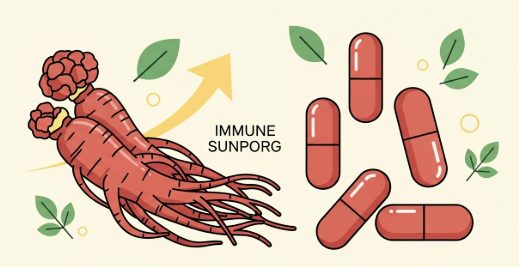Recovering from illness or prolonged fatigue can feel like a marathon. Even after symptoms disappear, many people notice lingering tiredness, low energy, and slow immune rebound. Modern lifestyles, combined with stress, poor sleep, and age-related changes, can make full recovery challenging.
For centuries, Korean ginseng (Panax ginseng) has been valued for its ability to support vitality and resilience. Today, scientific research helps us understand how ginseng may support the immune system, energy levels, and overall recovery.
This article explores ginseng’s role in immune recovery, highlighting mechanisms, traditional use, and modern research, in a narrative-informational style aligned with EEAT principles and Google Health content guidelines.
A Personal Story: Bouncing Back After a Long Flu
Consider David, a 48-year-old software engineer. After a week-long flu, he expected to feel energized again—but days later, he still struggled:
- Persistent fatigue
- Low motivation
- Mild brain fog
- Vulnerability to catching minor colds
David decided to incorporate Korean Red Ginseng into his recovery routine, along with balanced nutrition, hydration, and moderate movement. Within a few weeks, he noticed:
- Improved stamina during work and exercise
- Better focus and mental clarity
- Enhanced overall feeling of wellness
While individual experiences vary, this aligns with both traditional knowledge and scientific evidence regarding ginseng’s immune-supporting properties.
Why Immune Recovery Matters
After illness or extended fatigue, the immune system is often in a weakened or imbalanced state. Key factors include:
- Depleted immune cells – White blood cells and natural killer cells may temporarily decrease.
- Oxidative stress – Infection or prolonged stress produces free radicals, impacting cell recovery.
- Inflammatory processes – Chronic low-level inflammation can persist even after acute illness.
- Low energy production – Mitochondrial efficiency drops under stress or illness.
Supporting the body’s immune system during recovery is crucial to prevent reinfection, accelerate healing, and restore overall vitality.
Ginseng’s Bioactive Compounds
The immune-supporting effects of ginseng primarily come from ginsenosides—unique bioactive compounds that influence:
- Cellular immunity
- Anti-inflammatory pathways
- Antioxidant activity
- Hormonal and stress-response regulation
Different ginsenosides (like Rb1, Rg1, Re, Rc) have been studied for their role in enhancing immune resilience.
How Ginseng Supports Immune Recovery
1. Enhancing Natural Killer (NK) Cell Activity
NK cells are part of the body’s first line of defense against infections.
Studies suggest that ginseng may support NK cell activation, helping the body respond more effectively during recovery from illness.
2. Supporting White Blood Cell Function
White blood cells are essential for fighting pathogens.
Research indicates that ginseng may stimulate proliferation and function of key immune cells, aiding in the recovery process.
3. Anti-Inflammatory Support
While inflammation is part of healing, chronic low-grade inflammation can delay recovery.
Ginseng has anti-inflammatory properties, which may help balance the immune response and support overall health.
4. Antioxidant Effects
Oxidative stress can impair cellular recovery.
Ginseng’s antioxidant properties may help protect immune cells and other tissues from free radical damage, supporting faster recuperation.
5. Energy and Vitality Support
Immune recovery is not just about cells—it’s about feeling energetic and resilient.
Ginseng supports steady energy levels, which can help individuals gradually resume normal activities after illness or fatigue.
Modern Applications of Ginseng in Recovery
Many adults incorporate ginseng during:
- Post-viral recovery
- Fatigue from prolonged stress or work
- Recovery from seasonal illnesses like colds or flu
- General immune support in winter or high-stress periods
Ginseng is often combined with balanced nutrition, hydration, sleep, and moderate physical activity to maximize recovery.
Forms of Ginseng for Immune Support
1. Standardized Capsules
Provide consistent ginsenoside content and convenient daily dosing.
2. Liquid Extracts or Tinctures
Easily absorbed and convenient for quick consumption.
3. Tea or Infusions
Traditional, enjoyable, and hydrating.
4. Fermented Ginseng
May improve bioavailability of active compounds and absorption.
Who Can Benefit from Ginseng in Recovery
Ideal candidates include:
- Adults recovering from viral infections
- Individuals with prolonged fatigue
- Seniors seeking gentle immune support
- Anyone looking to boost resilience after stress or illness
Safety Note: Always consult a healthcare professional if pregnant, breastfeeding, or taking medications.
Why Korean Red Ginseng Is Preferred
Red ginseng is steamed and dried, which:
- Enhances ginsenoside content
- Strengthens antioxidant and anti-inflammatory properties
- Supports consistent immune and energy benefits
Six-year-old roots are considered the gold standard for potency and quality.
Conclusion
Recovering from illness or prolonged fatigue can be a slow process, but natural allies like Korean Red Ginseng may help:
- Support immune cell function
- Reduce lingering inflammation
- Protect cells from oxidative stress
- Maintain energy and vitality
By complementing a balanced lifestyle—including nutrition, hydration, sleep, and gentle activity—ginseng can help adults feel stronger, clearer, and more resilient after illness or periods of fatigue.







